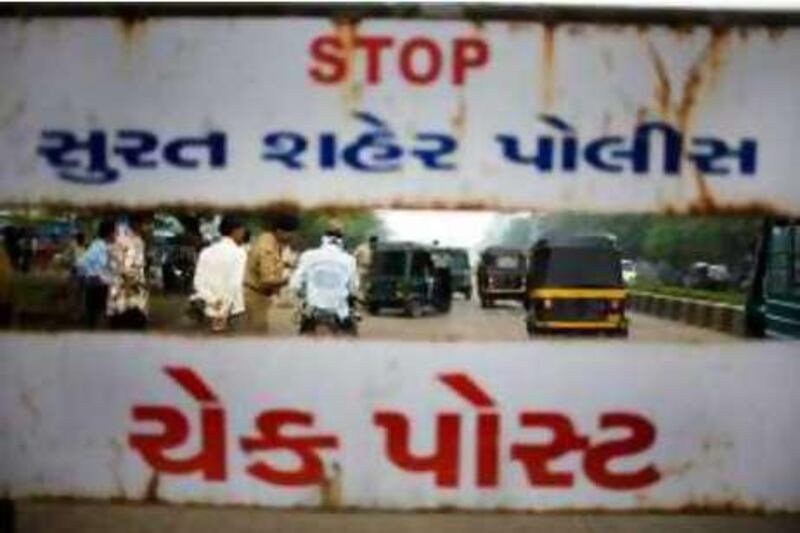NEW DELHI // Surat may be renowned as a city studded with diamonds, where the bulk of the world's precious gems are cut and polished, but lately it is earning a far less gleaming reputation - as a city studded with bombs. The problem began when police found an explosive device planted near a bridge in the city's Katargam district. Investigators found 18 live bombs in the city on July 29 alone, with one of those bombs discovered a stone's throw away from the state's visiting chief minister, Narendra Modi.
In all, 25 live bombs were discovered in the span of a week, all successfully defused by police. Last week, two men charged with planting the bombs made a preliminary appearance in court. There remain, however, lingering doubts not only as to whether police got the right men - but whether to expect more bombs. After all, the same group claiming responsibility for the recent spate of blasts - the Indian Mujahideen - was behind similar attacks in Bangalore on July 25, killing one person, and in Ahmedabad the very next day, claiming 49 lives.
So why did the bombs not go off? "You could say that it was part luck that none of these bombs exploded," said Brahma Chellaney, a professor of strategic studies at the Centre for Policy Research. "It could also be partly the poor work of the bombers that they have not fabricated these bombs with equal sophistication." A more optimistic scenario has the sleeper cell in Surat simply being less bloodthirsty than cells in Ahmedabad, the state capital of Gujarat, about 250km away.
"One explanation could be that the group in Surat did not intend to kill any people," Mr Chellaney said. "It's one thing for bombers to kill high-value targets, like politicians, but to leave live bombs in market places and other public places and allow innocent people to die, what objectives can be served by that? "That really doesn't shake the state or shake the governing elites. Or do anything to achieve your objective."
Unlike the deadly Ahmedabad blasts, the eight bombs that did detonate in Bangalore were of low intensity and planted in obscure nooks such as drains and traffic islands, suggesting that there, too, the militant cell was taking dead aim at the Indian economy, rather than its citizens. "The targets [were] chosen very carefully," Mr Chellaney said. "High on the list have been targets that symbolise the economic boom, whether it's Mumbai, whether it's Bangalore, whether it's Surat; these are symbols of a fast-emerging Indian economy."
About 92 per cent of the world's diamonds are cut and polished in Surat, which boasts one of the country's highest GDP growth rates, at 11 per cent. Likewise, nearby Ahmedabad is a pharmaceutical hub that also boasts a strong diamond-cutting industry. And Bangalore houses the vast majority of India's IT industry, besides being the fastest growing major city in the country. If the unexploded bombs were designed to rattle the diamond capital, the results were mixed - security personnel remain on edge, but the diamond industry churns, contributing about US$11 billion (Dh40bn) annually to the country's economy.
"It's business as usual," said Arvind Kapadia, former president of the Southern Gujarat Chamber of Commerce and Industry. "Actually, people are not worried. There were no blasts, no injuries. But now, people have become very active." Not only that, but police have stepped up their surveillance dramatically in the capital - despite, according to reports, being chronically understaffed. Mr Kapadia describes police checks at every turn and a heightened public vigilance.
"In every hotel, no one gets entry without check-ups and proper identification. If one wants to stay at any of the hotels, he is asked to have identification, and then, and only then, are they allowed to stay in the hotels." The failed attacks in Surat are also casting light on who may really be behind the bombings. Bombs discovered in Surat were built with integrated circuit chips - a technique made notorious by Jemaah Islamiyah, a militant group in Indonesia. It is the first time such chips have been discovered in India.
Jemaah Islamiyah has used integrated circuits with deadly precision in several bombings in Indonesia, where it aims to establish an Islamic state. For Indian security forces, however, the most chilling revelation may be the strong ties between Jemaah Islamiyah and al Qa'eda. Although al Qa'eda may not have engaged in any known activities in India to date, the presence of integrated circuits suggests its shadowy hand may be somewhere behind the Indian Mujahideen.
"In antiterrorist meetings that I've been to in the world, al Qa'eda is usually defined as a loose network," Mr Chellaney said. "I would be very surprised if there is no al Qa'eda link between these various groups that are operating and carrying out bombings whether in India, in Southeast Asia or in Spain or in Afghanistan." "According to Indian intelligence, the Indian Mujahideen doesn't exist," Mr Chellaney said. "It's just a name given for Lashkar-e-Toiba."
The Pakistan-based group, whose name means "army of the pure", has a strong presence in India, focused mainly in the northern regions of Kashmir and Jammu. "The Lashkar-e-Toiba is known in this part of the world to operate under different names and create this impression that local Indians associated with terrorist activity came up with this very Indian name," Mr Chellaney says. "But Indian intelligence agencies have found no evidence of any such group by that name in existence."
ccotroneo@thenational.ae





